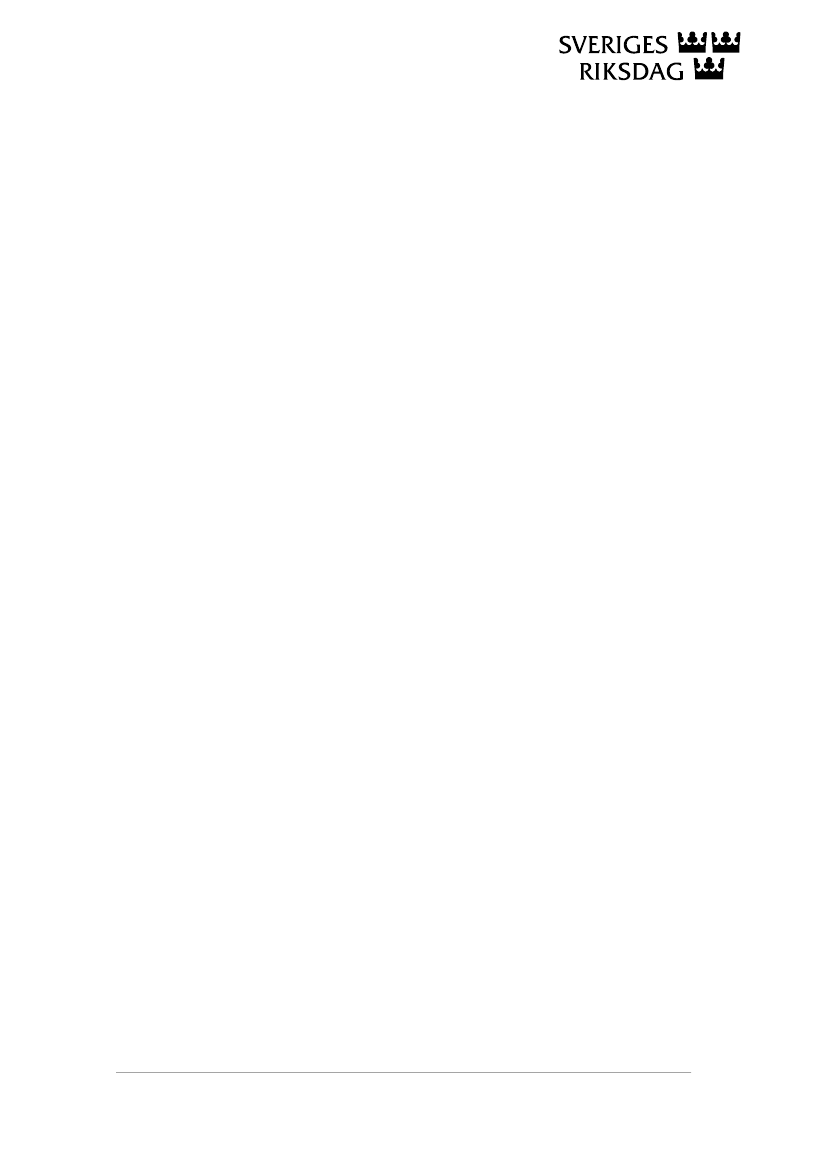Europaudvalget 2010-11 (1. samling), Erhvervsudvalget 2010-11 (1. samling)
EUU Alm.del Bilag 213, ERU Alm.del Bilag 145
Offentligt
Anna Kinberg BatraCommittee on FinanceChair
Stockholm 21 December 2010Wolf KlinzThe European ParliamentChairman of the Special Committee on theFinancial, Economic and Social Crisis
Dear Mr Chairman,Thank you for your letter concerning the resolution on the financial, economic andsocial crisis. The issues dealt with by your Committee are of great importance. TheSwedish Parliament’s Committee on Finance follows these issues in various ways,including through information from and deliberations with the Minister for Financeon economic developments in the EU. In addition, the Government consults theParliament through the Committee on EU Affairs ahead of every Ecofin decision, forexample, the decisions on support to Greece and Ireland.In our parliamentary economic policy debate, the value of stable public finances hasbeen emphasised. It is therefore crucial that the Stability and Growth Pact isrespected. It is important to keep public finances in good order.In the enclosed Statement 2009/10:FiU40 on Reinforced Economic PolicyCoordination, the Committee gives an account of the way in which the SwedishParliament makes decisions on the central government budget, according to aprocedure known as the framework model.In Statement 2007/08/FiU14. the Committee has considered the review of the EU’slong-term budget. As the enclosed Statement shows, the Committee opposes theintroduction of any form of EU tax. According to the Committee, there is broadpolitical and popular opposition to the idea of granting the EU the right to levy taxes.This right is and should continue to be a national concern.In view of the negotiations in the EU regarding both the budget for 2011 and theforthcoming long-term budget, it must be stressed that the Committee on Finance’sfocus as regards EU budget policy is on budget restrictiveness and on reforming andmodernising the EU's budget.The Committee has considered these issues in separate contexts. In this context, fourspecific statements on four different consultation documents from the EuropeanCommission can be highlighted:
SVERIGES RIKSDAG
•
100 12 STOCKHOLM
•
TFN 08-786 40 00
Communication from the Commission on Reinforced Economic PolicyCoordination (COM (2010) 250);Green Paper from the Commission on Corporate Governance in FinancialInstitutions and Remuneration Policies (COM (2010) 284);Communication from the Commission Europe 2020 - A strategy for smart,sustainable and inclusive growth (COM (2010) 2020);Communication from the Commission Reforming the Budget, ChangingEurope, A public consultation paper in view of the 2008/2009 Budget Review(SEC (2007) 1188).
The summaries of these statements have been enclosed with this letter in order togive you a brief overview. Further, a memorandum is enclosed with a presentation ofthe positions put forward in the four statements. Reservations from the oppositionparties are also presented. In addition, the statements are enclosed in their entirety (inSwedish).The Committee on Finance will continue to monitor these issues. I look forward tocontinued contacts with you and your Committee.Yours sincerely,
Anna Kinberg Batra
2
Summary of Statement 2009/10:FiU40 on reinforcing economic policy
coordination
In this Statement, the Committee considers the Communication from the EuropeanCommission, Reinforcing Economic Policy Coordination, COM(2010)250).The Committee emphasises that the economic crisis has demonstrated the need forstable budgetary frameworks, both at the national level and the EU level. It istherefore crucial that the Stability and Growth Pact is respected. It is important tokeep public finances in good order.As regards the proposal for a “European Semester”, the Committee wishes to stressthat, in its opinion, it is not appropriate for the Budget Bill to be examined inadvance in the EU before it is presented to the Riksdag. It is the Riksdag that decideson the budget, both expenditure and revenue, and the proposal for the centralgovernment budget must therefore be presented to the Riksdag first.It is not always clear from the Commission’s Communication what measures areintended only for those countries that have introduced the euro as their currency. TheCommittee would like to stress that the European Union consists of cooperationbetween 27 equal states. Even if there may be reason for the euro area countries tointroduce more detailed rules internally, the interests of the Union as a whole mustalso be taken into account when the euro area countries hold their deliberations.It is important that the quality of public finance statistics is enhanced. TheCommittee has held deliberations with the Minister of Finance regarding theCommission’s proposals on this matter. The Committee stressed that a solution needsto be found to the issue of statistics secrecy, and assumes that this will also be thecase.Sweden’s experience shows the value of stable budgetary frameworks. With thechanges introduced since the mid-1990s, the various stages in the Swedish budgetprocess have been tightened up. The more stringent budget process has helped tostabilise economic policy.The Committee proposes that the Riksdag file the Statement. The Statement containsone reservation from the Left Party.Summary of statement 2009/10:FiU41 on the Green Paper on Corporate
Governance in Financial Institutions and Remuneration Policies
In this Statement, the Committee on Finance considers the European Commission’sGreen Paper, Corporate Governance in Financial Institutions and RemunerationPolicies, which was presented in early June.The Committee emphasises that the financial crisis has demonstrated the need formore effective control of the actors on the financial market. Inappropriately designedremuneration schemes in the financial sector can lead to excessive risk-taking, withconsiderable socio-economic costs. It is therefore necessary to find a solution that3
can conduce remuneration policies that are compatible with requirements for soundand effective risk management and that ensure a long-term perspective in theactivities of financial companies.The Committee discusses the Commission’s proposal for a directive on AlternativeInvestment Fund Managers (AIFMs). In this context, it is crucial to find anappropriate and balanced system of regulation. It is therefore important to clarifywhich managers the proposal applies to.The Committee recalls that, during its Presidency of the Council of the EuropeanUnion in the second half of 2009, Sweden actively pushed ahead work with financialsupervision. Rules on remuneration policies in the financial sector have beenimplemented at the national level.As regards regulation of corporate governance in financial institutions, theCommittee would like to stress that we should proceed carefully with changes thataffect the current division of roles between shareholders, boards and operativeleadership in Swedish financial institutions. The Committee would also like to stressthat a sound corporate culture is important.The Committee proposes that the Riksdag file the Statement.
Summary of Statement 2009/10:FiU29 Statement on the future EU 2020
strategy
In this statement the Committee on Finance considers the Commission'sCommunication Europe 2020 – A strategy for smart, sustainable and inclusivegrowth, presented in early March.The Committee considers that the EU 2020 strategy can make a significantcontribution to the work of increasing the EU's growth potential and employment.The Committee notes that a strategy for the future should have a more general focusand be oriented towards long-term structural growth. The strategy should be orientedtowards increasing the competitiveness of the European economies and thusincreasing Europe's long-term employment. If welfare and prosperity are to bemaintained in the EU states the question of developing business enterprise isdecisive. Conditions for starting companies must be as straightforward as possible.The strategy should contribute to sustainable public finances and promote acompetitive, green economy and an efficient use of resources. The Committee notesthat Sweden is well-placed in relation to the targets specified by the Commission.For Sweden to continue showing good results, policies are needed that are orientedtowards (in the Commission's words) smart, sustainable and inclusive growth. TheEU and its member states must implement policies that meet the structural challengesfacing them.The Commission singles out three areas for action. With regard to smart growth, theCommittee emphasises the importance of research for long-term economicdevelopment. With regard to sustainable growth, the Committee calls attention to theimportance of economic instruments in relation to environmental policy. With regardto inclusive growth, the Committee wishes to give particular emphasis to the fact that4Sweden is energetically engaging with the issue of women's participation in thelabour market. Although Sweden's position has been favourably received, in thatgender equality issues are taken up in the Commission's Communication, there arestill no concrete targets stating explicitly that increased employment must apply toboth women and men. The Committee on Finance points out that the issue of greaterparticipation by women in the labour market will need such sharp focus in ourongoing work that a clearly specified employment ratio target for women is highlydesirable. To successfully meet such an employment target it is necessary for womenand other groups currently outside the labour market to too high a degree to be givenincentives and instruments to facilitate entry. It is the view of the Committee onFinance that this circumstance should be reflected in the overall targets of the EU2020 strategy, as well as in future integrated guidelines and employment guidelines.The Committee's statement also deals with matters relating to the EU budget, publicfinances, and governance. The Committee notes that a restrictive approach shouldinform budgetary policies in the EU.The Commission's Working Document: Consultation on the future "EU 2020"strategy, of November 2009 is also included in this consideration.The Committee on Industry and Trade, the Committee on the Labour Market, theCommittee on Transport and Communications, the Committee on Social Insurance,and the Committee on Justice have communicated their views to the Committee onFinance. Their statements of opinion show the scope of the issues being put on theagenda in this matter.This opinion contains 4 reservations from representatives of the Social DemocraticParty, the Left Party and the Green Party.
Summary of Statement 2009/10:2007/08:FiU14 Review of the EU-budget
In May 2006 the European Parliament, the Council and the Commission urged theCommission to make a complete and comprehensive review of all aspects of the EU'sexpenditure and revenue and present a report on this in 2008–2009. In September2007, as a part of this review, the Commission called for a broad process ofconsultation intended to provide an important starting point for the Commission’scoming report. The consultation process will end on 15 April 2008. The Commissionwishes to carry out the budget review using a long-term perspective, but the review isnot intended to contain any budget proposals after the close of the current budgetperiod which will last until 2013.The Committee on Finance supports the principles and points of departure that theGovernment considers should determine the budget – subsidiarity, European addedvalue, proportionality, sound financial administration, and restrictivity.The Committee considers that the capacity of the EU budget to adapt to changedpreconditions and demands has been inadequate. Although the composition of thebudget's expenditures has changed, they are still noticeably dominated by"traditional" expenditures, i.e. agricultural policy and regional policy. Expendituresfor areas like competitiveness, R&D, and environmental and climate policy have5admittedly increased, but from very low levels.The Committee considers that a thorough reordering of the priorities of EU budgetexpenditures is needed, and that the changes should be made without an increase inoverall budget expenditure.The Committee advocates a drastic reduction of the EU budget's expenditure onagricultural policy and emphasises that the special review of agricultural policy nowunder way, the Health Check, should not entail any restriction on the possibility ofreforming agricultural policy and reducing its dimensions.Regional policy also needs to be reformed both with regard to design and volume.The Union's regional policy efforts should be centred on those countries in the EUwhich have a clearly lower level of prosperity than the average. The benefits ofregional policy support for the EU's richer countries are highly questionable.A number of areas need to be given higher priority to meet current and futurepolitical and economic challenges. There is a need for more focus oncompetitiveness, R&D, strategic investments in infrastructural projects, andexchange programmes in the field of education. Legal matters such as serious cross-border crime, trafficking in human beings, drug smuggling and terrorism also needincreased resources. If the EU wishes to play a leading role on a global scale, it mustalso be ready to work actively to improve democracy and human rights. This alsorequires greater efforts. The Committee on Finance especially wishes to emphasisethat together with R&D efforts, environmental and climate issues should be givenhigher priority. The Committee considers that there are good reasons for efforts atEU level within both these areas.Sound financial administration is one of the basic principles that the upcomingreforms of the EU budget should be based on, and the Committee considers itnecessary to improve the checks to ensure the appropriate and efficient employmentof EU funds. The Court of Auditors should also be given greater powers to conductefficiency audits to determine whether various programmes of expenditure areappropriately designed to achieve their policy objectives. Transparency, simplicityand an explicit division of responsibility should be aimed for in the design of boththe budget as such and the individual expenditure programmes.In the Committee's view, the budget's revenues and expenditures must be viewed in asingle context. Adjustments and rebates have arisen because the aggregate burden ofthe budget has become unreasonably skewed between Member States, and this in itsturn results from the expenditures being very unevenly distributed. A reform of theelements making up both revenues and expenditures must therefore be viewed in acoherent perspective.The Committee opposes the introduction of an EU tax. The Committee considers thatthere is broad political and popular opposition to transferring the right of taxation tothe EU.The Committee also considers that the European Parliament should be located inBrussels alone.The Left Party and the Green Party submitted reservations.6
7







